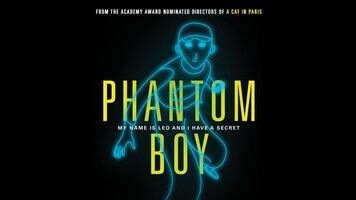The animated Phantom Boy partners a hurt cop with a super-powered kid

By now, the American animation distributor GKids has become such a trusted name that even its lesser releases are a must-see for fans of the medium. Phantom Boy is the follow-up to Jean-Loup Felicioli and Alain Gagnol’s surprise Academy Award nominee A Cat In Paris, and while it lacks the fleetness of the earlier film, once again the filmmakers bring a design sense and a set of storytelling influences unlike anything happening in feature-length cartoons today. With a visual and narrative style that resembles American cartoonist Richard Sala, Felicioli and Gagnol explore an urban landscape filled with master criminals, wily detectives, intrepid reporters, and supernatural phenomena. Even though it doesn’t all come together thrillingly, Phantom Boy garners a lot of goodwill just for looking and feeling original.
The boy in Phantom Boy is Leo, a preteen New Yorker who, at the start of the film, is hospitalized with an unnamed illness that appears to be either cancer or cancer-adjacent (judging by the fact that Leo has his head shaved when he’s admitted). Not long after he arrives, the hero meets Alex, a brave cop recovering from a crippling on-the-job injury. Around the same time, the boy discovers that he has the power to leave his physical body behind and to float, unseen, throughout the city. Soon Alex and Leo are teaming up from their hospital rooms, remotely working to foil a crime wave masterminded by the masked gangster known as The Man With The Broken Face. Their main ally in this crusade is Mary, an investigative journalist who believes their wild “hunches.”


![HBO teases new Euphoria, Larry David, and much more in 2026 sizzle reel [Updated]](https://img.pastemagazine.com/wp-content/avuploads/2025/12/12100344/MixCollage-12-Dec-2025-09-56-AM-9137.jpg)





































